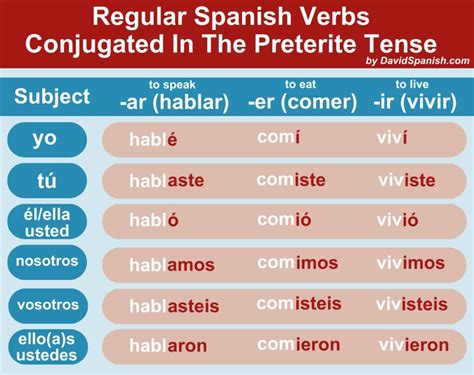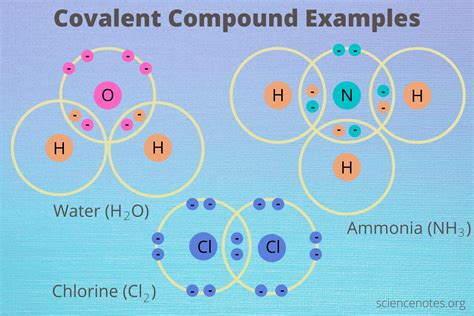The preterite tense is a fundamental concept in Spanish grammar, used to describe completed actions that occurred in the past. Among the various verb conjugations in this tense, preterite ir verbs hold a unique position due to their distinct conjugation patterns. Understanding these verbs is crucial for effective communication in Spanish, as they are used to express a wide range of past actions. In this article, we will delve into the world of preterite ir verbs, exploring their conjugation, usage, and providing examples to illustrate their application in real-life scenarios.
Before diving into the specifics of preterite ir verbs, it is essential to establish a foundational understanding of the preterite tense. The preterite tense, also known as the simple past, is used to describe actions that started and ended in the past. It is often contrasted with the imperfect tense, which describes ongoing or repeated actions in the past. The preterite tense is typically used to narrate events, describe past habits, and express actions that occurred at a specific point in the past.
Key Points
- The preterite tense is used to describe completed actions in the past.
- Preterite ir verbs have distinct conjugation patterns.
- Understanding preterite ir verbs is crucial for effective communication in Spanish.
- The preterite tense is often used to narrate events, describe past habits, and express actions that occurred at a specific point in the past.
- Mastering preterite ir verbs requires practice and a deep understanding of Spanish grammar.
Conjugation of Preterite Ir Verbs
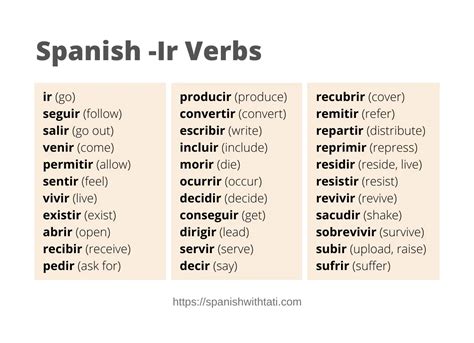
The verb ir, which means “to go,” is a highly irregular verb in Spanish. Its preterite conjugation is unique and does not follow the typical -ar, -er, or -ir verb endings. Instead, the preterite tense of ir is conjugated as follows: fui (I went), fuiste (you went), fue (he/she/it went), fuimos (we went), fuisteis (you all went), and fueron (they went). This irregularity makes it essential to memorize the conjugation of ir in the preterite tense to use it correctly in sentences.
Examples of Preterite Ir Verbs in Sentences
To illustrate the usage of preterite ir verbs, consider the following examples: Ayer fui al parque (Yesterday, I went to the park), Ella fue a la tienda (She went to the store), and Nosotros fuimos al cine (We went to the movies). These examples demonstrate how preterite ir verbs are used to describe completed actions in the past.
| Subject | Preterite Conjugation of Ir |
|---|---|
| Yo | fui |
| Tú | fuiste |
| Él/Ella/Usted | fue |
| Nosotros/Nosotras | fuimos |
| Vosotros/Vosotras | fuisteis |
| Ellos/Ellas/Ustedes | fueron |
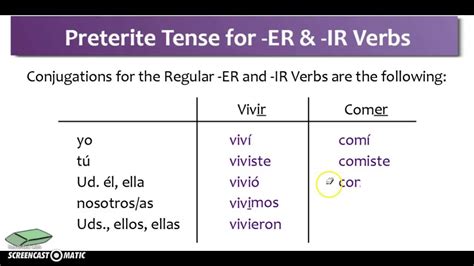
Practical Applications of Preterite Ir Verbs
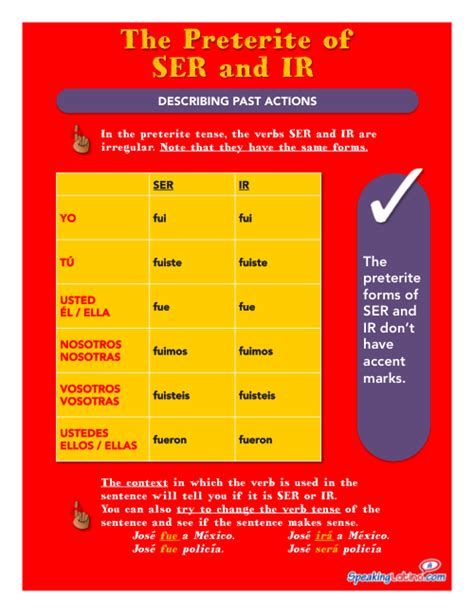
Preterite ir verbs have numerous practical applications in everyday Spanish conversation. They can be used to describe past experiences, narrate stories, or simply to convey information about past actions. For instance, La semana pasada fui a una conferencia (Last week, I went to a conference) or El año pasado fuimos de vacaciones a la playa (Last year, we went on vacation to the beach). These examples illustrate how preterite ir verbs can be used in a variety of contexts to communicate effectively.
Common Mistakes with Preterite Ir Verbs
One of the most common mistakes made by learners of Spanish is the incorrect use of preterite ir verbs. This can stem from a lack of understanding of the preterite tense or confusion with other verb conjugations. To avoid these mistakes, it is essential to practice using preterite ir verbs in context and to seek feedback from native speakers or language instructors.
In conclusion, preterite ir verbs are a vital component of Spanish grammar, allowing speakers to describe completed actions in the past. By understanding the conjugation and usage of these verbs, learners can improve their communication skills and express themselves more effectively in Spanish. With practice and dedication, mastering preterite ir verbs can become a valuable tool in the pursuit of Spanish language proficiency.
What is the preterite tense used for in Spanish?
+The preterite tense is used to describe completed actions that occurred in the past.
How do you conjugate the verb ir in the preterite tense?
+The preterite conjugation of ir is: fui (I went), fuiste (you went), fue (he/she/it went), fuimos (we went), fuisteis (you all went), and fueron (they went).
What are some common mistakes made with preterite ir verbs?
+Common mistakes include incorrect use of the preterite tense and confusion with other verb conjugations.
